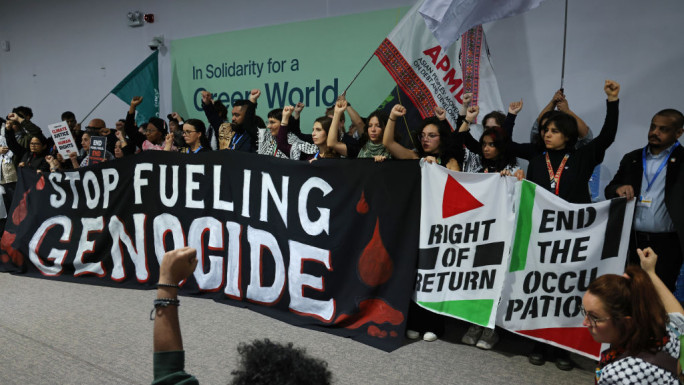
UK: A Scottish Nationalist victory might boost Palestinian cause
In the UK, the attack by the Islamic State group (IS) on the Yarmouk refugee camp in Damascus is giving us a rare glimpse of the wretched vulnerability of Palestinian refugees.
What is not explained to news consumers is the historic context in which the attack has taken place and the steps that could be taken to end the plight of the refugees.
UN Resolution 194 guarantees the right of return for the Palestinian refugees to Israel/Palestine and its fulfilment would do much to end the Arab-Israeli conflict and therefore reduce the appeal of groups like the IS.
This right is blocked by Israel, and although the UK is committed to the right of return in theory, in practice it does little to facilitate it. It is a mark of Israel's success that today they face zero pressure from the West to open their borders to the Palestinian refugees of Syria. Even in left-wing, liberal media in the UK, use of the word "Israel" has been rare in reports on Yarmouk, and mentions of Resolution 194 cannot be found.
| In the UK, successive governments have failed to live up to their responsibilities to Palestinian refugees. |
Given that reliance on the United Nations Relief and Works Agency is demonstrably insufficient, and given that peace talks are at a standstill, a new approach is required.
In the UK, successive governments have failed to live up to their responsibilities to Palestinian refugees. With the general election less than a month away, all the polls suggest that there will be no outright majority in parliament, the most interesting outcome for supporters of Palestinian rights might be a coalition or less formal agreement between Labour and the Scottish National Party (SNP). The influence in government of a party that defines itself by its differences from the major parties and the principle of national self-determination and independence could be a positive change for Palestine.
Even-handedness
The SNP has offered more willingness to be even-handed in its Middle East policies and statements than the traditional major parties. The SNP has called for the end to the "illegitimate" blockade of Gaza, supported Palestine's bid for enhanced observer status at the UN and opposes the separation wall in the occupied West Bank.
However, the SNP has also shown a tendency to fall more into line with traditional UK approaches when it has deemed it necessary. It has done this through support for US-brokered peace talks, condemnation of Hamas, proceeding with positive diplomatic relations with Israel and opposing the expansion of illegal settlements, rather than opposing the very existence of the settlements.
The SNP leadership changed hands last year after they lost the referendum on Scottish independence. The new leader, Nicola Sturgeon, is seen as more moderate and conciliatory in style than the previous leader Alex Salmond. Sturgeon will remain a member of the devolved Scottish parliament (MSP) and the party's leader, while Salmond is running to be a member of the UK parliament (MP). The two have the potential to be a formidable combination capable to challenging and upsetting the complacency of the established powers in Westminster.
On Palestine, Sturgeon has been conservative. In 2009, as SNP deputy leader, she expressed alarm at Israel's assault on Gaza, but also spoke of Israel's "right to defend itself". Sturgeon supports Palestinian independence, and under her expect the SNP to place less emphasis on Israel's rights and Hamas crimes than Labour, the Conservatives or Liberal Democrats.
It is the charismatic Salmond, though, who offers most hope for those wanting to see new life breathed in to the issue of Palestine in the UK parliament. He has a track record of outspoken and stinging criticism of UK foreign policy. Most famously he opposed the Iraq war and used the "disgrace" of the invasion to differentiate himself from Tony Blair and the Labour party.
Stands on principle
Salmond also has a track record of scathing criticism of UK policy on Palestine. In 2004 he labelled as "cowardly" the UK's decision to abstain on a UN resolution condemning the assassination of Sheikh Ahmed Yassin and described Blair's support for the US policy of seeking to preserve illegal West Bank settlements as "foolish".
On British television in 2010, Salmond condemned Israel's assassination of Hamas member Mahmoud al-Mabhouh in Dubai, stating that it would be impossible to have "normal relations" with Israel if its theft of UK passports was proven, demanding the incident have "implications, for example in trading relationships".
In 2014, during Israel's massacre in Gaza, Salmond called for a UK arms embargo on Israel in protest, with the SNP condemning Israel's "depth of inhumanity".
| Salmond has a track record of scathing criticism of UK policy on Palestine. |
Salmond has also shown similar candour and clarity of thinking when taking on the dangerous conflation of Judaism and the state of Israel, something that no leader of a major party has been willing to do. While the Labour left hopes to shift Labour policy on Palestine gradually and works within the parameters of the pro-Israel bias in the party, Salmond faces no such restrictions, and would be backed by a Scottish population that is generally sympathetic toward the Palestinians.
Despite Salmond's willingness to go where Miliband and Cameron would never dare in his rhetoric on Israel, he has still pursued "normal" diplomatic relations with the Jewish state, and a future "Yes" vote in a referendum on Scottish independence would likely see Scotland joining NATO, which would mean absorption into US foreign policy.
The mercurial Salmond can be expected to continue to seize any opportunity to embarrass the Westminster parties and to present the SNP as the better option for Scotland. Palestine can play a useful role for him to this end. While any support for Palestinian rights is probably motivated as much by opportunism as conviction, in any partnership with Labour it might give the larger party pause for thought before it proceeds with its usual tepid approach to Israeli crimes.
And when the inevitable happens and the Palestinians are again under violent attack, calls for accountability and justice from the UK parliament may be louder than we're used to.






 Follow the Middle East's top stories in English at The New Arab on Google News
Follow the Middle East's top stories in English at The New Arab on Google News


